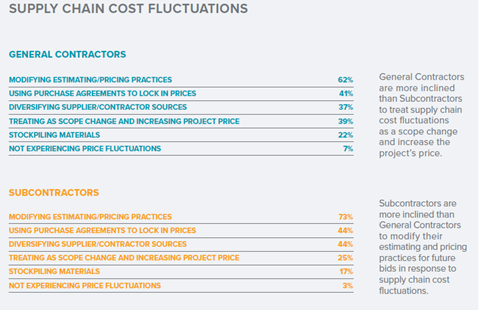As the days of January continue to tick away, we draw closer to January 20, 2025, Inauguration Day, whereby the world will watch as President-elect Donald Trump is sworn in for the second time. And while big campaign agendas are promised on the trail, one recent potential policy the incoming President has put forth could have significant implications on the construction industry; the implementation of tariffs, targeting imported goods from countries like Mexico, Canada, and China, which could reshape the landscape of construction projects in several ways.
Increased Material Costs
One of the more obvious components of construction to be impacted will be the impact on material prices, which have seemed to go in one direction in the past few years. A tariff program would not grant contractors any relief when it comes to commonly imported materials such as steel, aluminum, lumber, and cement, which would almost certainly see price hikes. This increase in costs would not only affect the overall budget of construction projects but also lead to supply chain disruptions, causing delays and further escalating expenses.
Uncertainty in Project Pricing
While some projects could be more impacted than others regarding the tariffs, projects currently being estimated and those in the mobilization stage would be affected the most. These potential and uncertain costs will add another layer of complexity to the estimation process making it challenging for contractors to price projects accurately. For projects already in process, once this program hits, fluctuating costs can lead to potential budget overruns, making it difficult for construction firms to maintain profitability and recover those additional costs. To mitigate these risks, some contractors might resort to stockpiling materials, which can drive up costs and create storage challenges, another hit to the bottom line.
Other Tariffs
Interestingly enough, while much of the conversation has been focused on the U.S. imposing tariffs, not much has been mentioned about Canada, Mexico and China developing their programs that target us. Retaliatory tariffs would not benefit global trade and could pull in other countries, those from which specialty construction materials are currently being imported from, which may be at a premium to begin with. This domino effect would only compound and complicate the cost and access to imported construction materials, potentially slowing down construction activity.
Infrastructure Projects
The need for a re-investment in the country’s infrastructure has been at the forefront of every construction conversation for the past decade. Federal funding has been made available and is starting to flow through to projects. And while the construction industry is incentivized to construct utilizing American-made construction materials, some components, raw or finished, come across our borders. Much like the sentiment above, tariffs will create an unbudgeted, undue cost that either the contractor or owner will absorb and ultimately be passed down to the end user, citizens via tolls.
For infrastructure projects that may already be struggling to mobilize, tariffs could lead to more funding challenges and another layer of uncertainty in their execution of these projects.
The potential implementation of the discussed tariffs presents a new set of challenges for the construction industry. While the overall arching theme is to boost domestic production, the immediate impact on costs and supply chains could be detrimental to the construction industry, leading to a long road to recovery. While some may feel supply chain issues are a thing of the past according to Grassi’s Construction Conditions and Outlook Survey, 36% of general contractors and 39% of subcontractors cited it a top risk for 2025. The survey further revealed best practices the industry has undertaken to be prepared for another disruption, potentially caused by tariffs:

The construction industry is resilient and will adapt by finding alternative suppliers, investing in domestic production, and/or adjusting project timelines to navigate these challenges. Still, there are financial and time costs associated with these strategies.
Construction firms must carefully plan and manage these emerging risks to navigate this evolving landscape, but by staying informed and proactive, the industry can adapt to these changes and continue to thrive in the face of new challenges.

